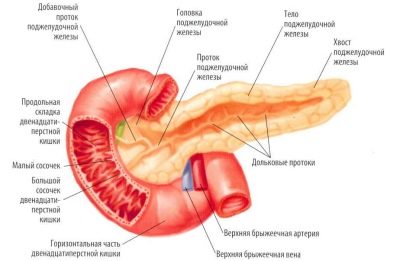Psychosomatics of diseases of the stomach and pancreas in children and adults
In Russia, mortality from diseases of the gastrointestinal tract, according to statistics, is in third place after oncology and cardiac pathologies. Disorders of the stomach and pancreas are very widespread - up to 68% of the total proportion of gastrointestinal diseases are allocated to gastritis, and up to 30% of all gastroenterological patients suffer from pancreatitis. These ailments do not choose people by race, sex, and age — both children and adults can suffer from them.
In this article we will consider the main psychosomatic mechanisms and causes of the development of diseases of the stomach and pancreas.
Signs of ailments
Food is necessary for a person so that he has an adequate supply of energy and nutrients, and the digestive tract is responsible for digesting food and assimilating these substances. Over a dozen organs work to take food, digest, leave necessary, and bring out unnecessary food.
In this article we will touch only the stomach and pancreas.
The stomach is a muscular organ that resembles a bag. On the one hand, it connects with the esophagus, on the other - with the duodenum. Food enters the stomach through the esophagus, where it is mixed to a uniform consistency and digested with the help of gastric juice, consisting of enzymes and hydrochloric acid. This composition allows you to break down proteins and fats into small components, after which the small intestine, which is responsible for absorption, comes into play.
The pancreas is a “neighbor” and “helper” of the stomach; it produces a pancreatic secret that is involved in digestion and metabolic processes. The most common problems with the stomach are gastritis with high or low acidity, peptic ulcer. Pancreas often makes it known about the violation of its functions by pancreatitis.
All diseases of the stomach and pancreas peculiar to common group of symptoms: indigestion, gastric upset, epigastric pain, nausea, upset stool, stomach heaviness, belching, bloating, general deterioration. Causes include violations of the principles of proper nutrition, overeating, consumption of fatty and unhealthy foods, bacterial factors, as well as stress, adverse environmental factors.
Psychosomatics of stomach diseases
Psychosomatics studies not only the physiological causes of the pathology, but also its connection with the psychological and psychological component of the personality of the sick person. In other words, this area of medical science can answer the question of why gastritis or an ulcer can appear on the nerves of soil, what kind of experiences can lead to such illnesses, and what is the psychological portrait of people suffering from gastrointestinal diseases.
The stomach is a “cauldron” that digests. But not only food, but everything that enters a person from the outside. This is understanding of events, new information, incoming problems. That is why stomach ailments always say that this is exactly what is violated in a person, psychological digestion.
Increased acidity
A stomach that is forced to work overtime, occurs in people who are accustomed to take on responsibilities and taking too much responsibility. He is so in favor of doing everything in time, which “digests” the new without rest. Other the cause of increased acidity is aggression on oneself. Such people are also responsible, but they not only do a lot of work, but also constantly bite themselves for allowing them to throw things to them once again.
Gastritis with high acidity is most often people with a high degree of professional responsibility.: air traffic controllers, nuclear power plant operators, professional drivers, especially those carrying people, train drivers. Please note that children who are loaded by parents at the same time with school, and sections, and courses of foreign languages, and at the same time require that the child is at a height everywhere, often suffer from the increased acidity of the stomach.
To get rid of the problem will help reduce excess workload, responsibilities. If you continue to give the child or adult medication and keep it on a diet without changing anything in their perception of their own responsibilities and duty, then the increased acidity will lead to an ulcer.
Low acidity
Patients with low acidity are usually infantile, relaxed. They can be responsible and make important decisions, and even make it from time to time. But they are invariably waiting for someone to fulfill their plans. Problems with such people can persist for a long time, because they are in no hurry to solve them, they are waiting.
Often, the acidity of gastric juice is reduced in children, because they are characterized by a certain infantilism, dependence on parents, and confidence that adults should decide everything and make.
But all children depend on parents, and not everyone has a low acidity of the stomach. The reason lies in the education and individual characteristics of the character. If a child from an early age is not accustomed to the independence available to him in age, if at six he is still dressed and put on by his mother, and his grandmother tries to feed him with a spoon, then the likelihood of stomach disorders increases significantly.
The way out of the painful condition is obvious - to increase the share of independence, to increase the sphere of responsibility, to demand that all our plans be realized, brought to a logical conclusion.
Gastritis and ulcers
Gastritis in acute form is most often caused by bacteria like Helicobacter pylori, but you should not shift all responsibility only to them. Bacteria live everywhere, and not everyone causes illness.
The stomach hurts due to the dystrophic changes of its walls mainly among those who cannot adequately “digest” information from the surrounding world.
It so happens that a man with the world quarreled or offended him or considers him imperfect and unfair. In this case he does not trust the world, does not trust the information that he receives. Fear of being offended again causes cramps in the stomach, and lack of self-confidence and the fear of failure suppress the normal functioning of an organ. The stomach hurts, and everything that enters it is poorly digested.
Anxious, suspicious people (adults and children) are more susceptible to gastritis.. Also this the disease is the affliction of people angry at the world but they, in addition to gastritis, may have other complications, for example, throwing bile into the stomach. They are said so about them - “gall man”, “ulcer”. If you don’t do anything and don’t try to constructively eliminate the evil attitude towards the outside world and people, then the ulcer is really within reach, because the inflammation and ulceration of the gastric mucosa will progress even against the background of medication.
Pancreatic problems
As you know, it produces enzymes. If the work of the gland is disturbed, the body begins to digest itself with enzymes, so pancreatitis develops. Psychosomatic medicine looks at this gland, as well as the stomach, from the standpoint of receiving and “digesting” information, events, problems from outside.
There is one important nuance - iron can change the structure of a substance, stratify it, differentiate it. This is what it does not only with nutrients, but also with those events that occur in human life. The iron symbolizes a person’s ability to separate flies from cutlets, to distribute problems and information according to importance. It is when a person grabs a large amount of problems and affairs, without dividing them into important, less important and unnecessary ones, that the pancreas inflames., and the doctor makes the same diagnosis - pancreatitis.
Problems with the pancreas occur in perfectionists who are used to doing everything perfectly.so that no one can find fault. In children, this is called "syndrome excellent." The mechanism of the development of the disease in this case is simple - a person brings himself to the fact that his pancreas works without interruptions and weekends at the highest revs. Little of, They want to make the whole world believe in their beliefs and standards. And when this does not work for them, another exacerbation of pancreatitis starts.and for the time being they go to “rest” on a hospital bed.
If several attacks do not convince a person of the need to stop overloading his pancreas and impose his “ideal” view on the order of things on the world, then the development of cancer of the gland is not excluded. It happened with the founder of “bitten apple” Steve Jobs.
There is one more type of people prone to pancreatic problems. These are very illegible personalities.who do not "lay out on the shelves" and accept everything that comes, even what they, according to them, "do not digest". Usually these are rather greedy people, consumers who do not know (if you drink, then to a severe hangover, if there is, then to nausea, if you make money, then everything, to the last penny, which is in the world, if you live in marriage, then not divorce, even if it is absolutely impossible to “digest” your partner) .
First, they start the pain and heaviness in the stomach. Then they begin to drown her drugs, including enzyme drugs, the pancreas relaxes and stops producing as many enzymes as needed. Such an adult or a child grabs a bunch of problems, and then asks others to help him understand them.Because the understanding that it is impossible to “digest” them yourself comes pretty quickly. Children of this psychotype are very sensitive to offers to share something with others., but themselves without a twinge of conscience seize other people's toys and candies.
Such schoolchildren very often take on everything: for participation in competitions and extracurricular activities, for sports and collecting beetles. But it’s impossible to cope with everything, and the parents, instead of letting the child understand that he has “sorted out” with intentions, do his homework for him, solve math problems or master another craft for a talent contest. Enzyme deficiency in chad while progressing.
Treatment should be based on identifying and correcting the exact cause. As long as the doctors think about what other medicine to prescribe to the patient, he is able to begin to work on “errors”. Suffering from pancreatitis need to temper the increased demands on themselves and others, to stop "press down" the world for themselves and their ideals.
They need to eliminate greed from their lives, learn to share, even if at first it will be difficult. Consume everything required in moderation - and food, and knowledge, and information. It will also be useful to learn how to disassemble the essence of the problems - important to solve in the first place, and minor ones leave for later.
General recommendations
Researchers in the field of psychosomatics (Liz Burbo, Louise Hay, Valery Sinelnikov and others) in the preparation of tables of diseases taking into account psychosomatic reasons indicated different root causes of diseases of the stomach and pancreas.But they all agree that the psychology of these ailments is quite complex and is largely related to the type of personality of the sick person.
In this regard, the general recommendations are as follows: if information from the outside “tastes” to you seems suspicious, you do not need to swallow it or try to digest it at any cost. It is necessary to carefully distinguish between events, divide information into important and less important "dishes", and only then decide whether it is necessary or not.
Parents who do not want children to have problems with the stomach and pancreas, in addition to proper nutrition, attention should be paid to how loaded the child is and what requirements adults place on it. If they are too high, the load should be reviewed..
Dangerous and lazy. When a person is chronically lazy, he develops chronic diseases associated with the same laziness of internal organs, including pancreatitis.



















